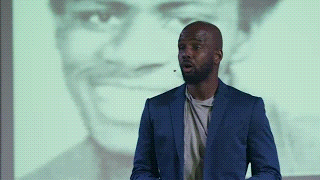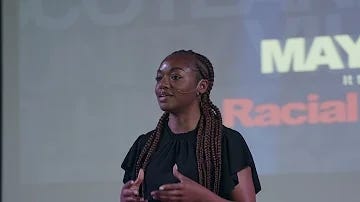With filmmakers' help, Scotlandville steps on to the international TEDx stage
“For this to be in Scotlandville is nothing short of amazing."
Elders and leaders of the Scotlandville community in Baton Rouge often reminisce of a time when the area flourished with businesses, competitive schools, professional residents, and violence-free entertainment.
They remember Scotlandville’s history as a successful community that was once the entry point for the slave trade and home to a cotton plantation. Only one Black family lived there in 1914 when Southern University and A&M College relocated to the area. It later became a destination for many Blacks during the Great Migration, which led Scotlandville to become the largest majority-Black town in the state.
Then, in the 1970s, residents attempted to incorporate the area but failed after the airport was moved into the area and altered the tax base.
Today, Scotlandville is home to the nation’s only historically Black university system and the state’s only eight-time Distinguished Academy of Engineering—housed at Scotlandville Magnet High.
Researchers like Youseff Danesh Ph.D. called Scotlandville “culturally distinctive.”
However, leaders and residents say Scotlandville’s capacity to thrive has weakened over time because of economic and educational disinvestment. Blight extends for blocks, a sewage-waste treatment station is fully operational, and abandoned apartment complexes are caving with blue tarp roofs in one area of Scotlandville, while other streets show subtle signs of reinvestment.
For example, there’s a Frisbee golf course in the public park, new charter school buildings, medical buildings, and redesigned storefronts. Scotlandville has also recently been certified as a cultural district by the Office of the Lieutenant Governor. The North Baton Rouge Now Coalition has initiated a campaign for Scotlandville’s National Historic Site Designation.
Even with those developments, “people were not very proud of Scotlandville,” said visual anthropologist Queen Muhammad Ali whose films and documentaries focus on changing the stereotypes about Blacks and indigenous people.
Why TEDx in Scotlandville?
At the start of the coronavirus pandemic last year, Ali was in the American Soma completing film work and also developing a social wellness hub to fight against diabetes. She and fellow cinematographer Hakeem Khaaliq flew to Celtic Studios in Baton Rouge to finish the production of “Coming Up Short”.
This led them to Scotlandville where they had to wait out travel restrictions caused by the spread of COVID 19. Ali said she and Khaaliq saw an opportunity to present Scotlandville to the world through a TEDx event.
“Scotlandville’s reputation is prominent, historical, cultural…and it will be again,” she said.
With approval from TED.com producers, Ali assembled a small team to organize Scotlandville’s inaugural TEDx event. It is also the state’s first TEDx event in a Black community.
On May 29, the 14 speakers–called talkers– stepped onto the red circle stage at Greenwood Park in Baton Rouge.
“For this to be in Scotlandville is nothing short of amazing,” said community activist Byron Washington. “Scotlandville is one of the most unknown historic communities in the country. Yet so many are impacted and don’t even know it. We have to not only talk about revitalization but live it,” he said.
Beyond strategic reinvestment, what else does Scotlandville need? How do residents start to recover its value and reclaim the community? To Ali, answers to these questions rest on a red circle of the TED Talk stage. It is where the world could see the prominence of Scotlandville which was—and is—sustainable for Blacks, she said. “It’s designed to give people a mic, showcase talent, voice a need. At minimal, the outcome was to push, uplift, and spark action. To see the area in a positive light.”
Who said what?
Taking the mic that day were 14 speakers who applied for a chance to present. It was Washington, Baton Rouge Mayor-President Sharon Weston Broome, City Councilwoman Chauna Banks, land literacy activist Louis Ali, Southern University College of Business interim associate dean Derrick Warren, president of the Scotlandville CDC and CADAV Pat LeDuff, biologist Yvonne Bey, conscious rapper Wise Intelligent, change agent Steve Kader, activist Myra Richardson, Claude Whitfield, founder of BackSpinz, architect Denver Terrance, and vegan restaurant owner Cornelius Roy.
Their talks covered beekeeping, gun violence, positive psychological reinforcement, the murder of Denver Smith at Southern University, airplane turbulence, imposter syndrome, overcoming fear, plant-based living, and community resources.
“The topic of my talk centered around gentrification. We always see it as a negative term because that’s the only option we have ever seen. What about we gentrify our communities on our terms? What about we gentrify our communities on our terms?” said Washington. For years, he has worked with North Baton Rouge Blue Ribbon Commission and has led the ongoing process to secure National Historic Site designation for Scotlandville. “We all want solutions. We love our history, our culture, and who we are. We have to find ways to make who we are fund where we want to go,” he said.
Washington’s message was consistent with founder of Rap Snacks and conscious rapper Wise Intelligent who said he took the stage to “give and receive insight, actionable steps, and creative ways to solve our collective problems.” His Talk “Everything the Village Needs is Already in the Village” explored the difference between under-resourced and over-extracted communities and how the community can control a larger share of its monetary, cultural, athletic, innovative, and influential resources.
For Claude Whitfield, founder of BackSpinz, his TEDTalk “Meeting your Vision Half Way” was presented to encourage Scotlandville and the world to keep going. He also wanted to be a part of the history that would take place on that day “My talk empowers the public to keep going, to push through and stay the course.”
Through her talk, “The Mask of Resilience,” Maya Galathe challenged social norms of society and the way emotions and mental health are viewed. “Black people in America live in a constant state of fear, stress, and survival mode. This has a greatly negative impact on our mental health. However, most Black people are taught to just push through and put on a happy face.” The racial trauma specialist said the TEDx stage allowed her to share that resilience is not always a good thing. “It is okay for us to stand back, acknowledge what we are feeling, and take breaks as needed. It is okay for us to simply show others empathy and compassion in hard times rather than trying to problem solve.”
Queen Muhammad Ali, who is recognized internationally for her research, said she plans to organize annual Scotlandville TEDx events because the feedback from the community has been “phenomenal. They are ready for the next one.”
By Candace J. Semien @jozefsyndicate







Encouraging